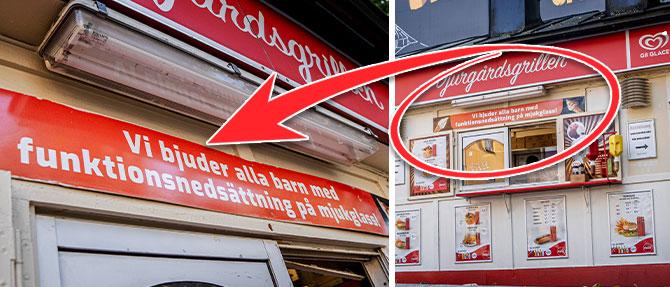Updated 15.15 | Published 15.03
unsaveSave
expand-left
full screen
chevron-rightnext
Djurgårdgrillen outside Gröna Lund in Stockholm.
1 / 2Photo: Robin Lorentz Allard
“We offer soft ice cream to all children with disabilities.”
The sign on the grill outside Gröna lund has evoked strong feelings and thoughts for several years.
– This is my industry and something that I feel I can do. I give children ice cream and they are happy, says kiosk owner Hisham Fares.
ⓘ The summary is made with the support of AI tools from OpenAI and quality assured by Aftonbladet. Read our AI policy here.
Show more
chevron-down
Eva has passed Djurgårdsgrillen outside Gröna lund in Stockholm several times during the summer.
The offer from the kiosk owner of free ice cream for disabled children, which is nailed to the facade, is something that she and her friends reacted to.
– It is certainly with all good intentions, but it does not feel right in my stomach. In my work, I have contact with high school youth who suffer from functional variations, among other things. They wouldn’t want to not be treated differently by getting free ice cream, she says.
Criticized online
Eva also questions who is included in the term “disabled”.
– Where do you draw that boundary? Is it only about people who have visible functional variations? If you have a son with poor eyesight, should he get soft ice cream?
On Facebook, the kiosk’s offer has received both rice and praise in recent years.
Some believe that it is indicative and that the offer would possibly be a case for the Discrimination Ombudsman. While others think it’s a nice initiative that has brought a lot of joy.
expand-left
full screen Photo: Robin Lorentz Allard
David Lega: “They want to do something nice”
Even the former Paralympian and MEP, David Lega, is divided about the offer.
– There is a risk that it would be strange towards siblings or other children. In addition, there are other ways to help children with disabilities. Among other things, by supporting organizations that work with these issues, he says.
At the same time, he believes that the purpose is good.
– They want to do something nice for children who don’t have the same opportunities as many others.
Lega was born with the disease AMC, arthrogryphos, which means that his arms are paralyzed and he lacks muscles in his legs. The discussion around the Djurgård grill brings back memories from his own childhood.
– In 1982, I was there when IFK Göteborg won the Uefa Cup. After the match, the players threw footballs into the crowd. We were a group of disabled children who sat at the front and had no balls thrown at us. Then Glenn Strömberg came forward and gave me a ball. I still have it today, says Lega and continues:
– But in light of this, I might have been offended and that is a concern. If you are afraid of making mistakes, there is a risk that you will not do anything at all. We must not end up there, then no one will even dare to look at children with disabilities.
expand-left
full screen
chevron-rightnext
1 / 2Photo: Robin Lorentz Allard
“It’s sick to be reported for wanting to offer ice cream”
Lega thinks the opinions that the offer is indicative and that it should be taken up by the Discrimination Ombudsman are exaggerated.
– It would have been sick to be reported for wanting to offer ice cream. I wouldn’t be stigmatized by getting an ice cream. I would be happy.
He also believes that there are significantly greater challenges for the disabled in society.
– To begin with, we are not a homogeneous group. We see how some manage to climb mountains all by themselves. At the same time, others are struggling to cope with working part-time. In order for people to gain a greater understanding of the problems, education is required. It is about trying to normalize what is unusual and different.
“I give children ice cream and they are happy”
Kiosk owner Hisham Fares says that a few customers are critical of the free ice cream.
– But the vast majority are happy when they see this offer. People come from all over the country and smile when they see the sign, he says.
Hisham has a child with a disability and therefore felt he wanted to do something nice for those who are in a similar situation.
– Before I started this, I was even in contact with Stockholm municipality to see if there were any problems. But they were only positive about the proposal.
He also sees no problem with drawing boundaries around who is covered by the offer.
– Sometimes we have to say stop when they come several times on the same day. But even those who do not have visible disabilities get soft serve ice cream.
Aren’t there other ways to support these children?
– There certainly is. But this is my industry and something I feel I can do. I give children ice cream and they are happy.
